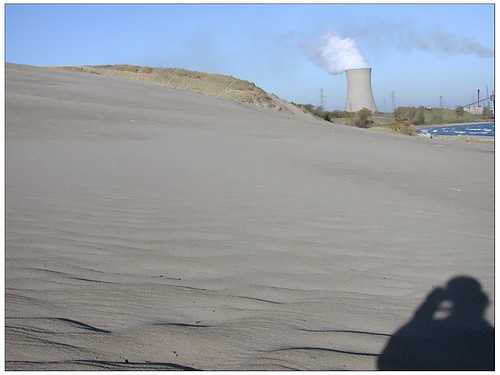Just trust that the energy companies are doing 'what they are supposed to', as a nuclear power apologist wrote in a recent comment to an earlier article. Radiation is probably good for you to drink anyway, and no energy company would ever cut corners on safety procedures to increase quarterly profits.
Chicago Tribune | For some, a new water worry Wilmington, aware the water in its deep wells contained radium, a naturally occurring carcinogen but at levels above federal limits, in 1990 decided to quit drawing from them and tap into the Kankakee River. Officials did not know the river often contained another potentially harmful substance, radioactive tritium, at levels up to 100 times higher than natural--albeit in amounts deemed safe by the government.The tritium was a byproduct of nuclear power generation at an Exelon Corp. plant a few miles upstream. It came from legal, regulated emissions at the Braidwood Generating Station. Federal, state and Exelon Nuclear officials said the tritium poses no health threat to about 6,000 people in Wilmington and an unincorporated subdivision that taps into the city's public water supply. “Personally, I would not let my kids drink that water,” countered Kathleen Burns, who holds a doctorate in public health and once did consulting work for the U.S. Environmental Protection Agency. “It's an unnecessary risk.”
Public forums are scheduled to educate jittery residents who say Exelon should have disclosed tritium spills years earlier. Exelon also recently disclosed tritium had leaked into the ground at Dresden Generating Station in Grundy County and into vaults at Byron Nuclear Generating Station near Rockford.U.S. Sen. Barack Obama (D-Ill.) said Wednesday he plans to introduce legislation that will require nuclear companies to notify state and local officials when leaks of radioactive substances exceed federal limits.
“If potentially hazardous materials are released into the environment, then those families living in the affected communities deserve to be notified immediately,” he said.
..
Tritiated water is diluted and released two to three times a week from Braidwood through a five-mile underground pipe into the Kankakee River, where it is further diluted by the river, Exelon officials said.The releases were halted last November, as Exelon explores the extent of contamination, considers disposal options and searches for ways to discharge less tritium. Meanwhile, it is storing tritium on site.
...
Arjun Makhijani, an engineer and physicist who specializes in nuclear fusion and is president of the Maryland-based Institute for Energy and Environmental Research, said the federal standards don't take into account the increased risk of miscarriage and birth defects related to tritium ingestion.They also “fail to recognize that all of us, I think even people in the nuclear industry, distinguish between voluntary and involuntary risks.”
Tags: Barrack_Obama, /Energy, /environment


1. I am not a nuclear power apologist.
Nuclear power is radioactively cleaner than the coal plants which would be in place if nuclear wasn't available. Coal is natively 1ppm uranium, and parts of this are sent into the smokestack. A source: Coal Combustion
2. I said, "no one implicitly trusts them". I check too.
3. Again, I ask, what exactly did Excelon do wrong with this situation? They were shutting down for refueling, 3 indicators got stuck, they followed the book, called the state, evaluated and reset the indicators as prescribed, and solved the problem.
You may not be an actual nuclear power apologist, but based on the total sum of data I have about you, two comments left in defense of Exelon, you certainly resemble one.
Do I have a solution for clean energy? No. Is nuclear power less objectionable than coal? Perhaps, once the radioactive waste issue is figured out. Are these the only options?
Did I write anywhere that Exelon did something wrong? No, just that I am inherently suspicious of press releases assuring a jittery public that there is nothing to worry about.